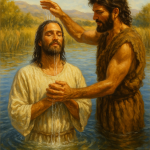1. The Origin of Divinity: Ein Sof Alone Is God
At the root of all existence is Ein Sof — the Infinite, the Boundless, the Absolute. Ein Sof has no beginning and no end, no form and no opposite. He is not “one” in the numerical sense, but utterly without division. Unlike all else that exists, Ein Sof is not created, not emanated, not derived. He simply is — Being beyond being. This is what makes Him alone truly divine. His essence is unknowable, uncontainable, and utterly indivisible. If anything were to touch His essence unmediated, it would cease to exist — consumed by the sheer intensity of infinite being.
2. Yahweh: The Face of the Infinite
Yahweh is the Name through which Ein Sof makes Himself known within the created order. He is not separate from Ein Sof, but the revealed face — the vessel through which Infinite Light becomes relational. Yahweh is the first act of contraction and communication: the I Am That I Am (Ehyeh Asher Ehyeh), the Being who enters into covenant, law, and history. Yahweh is Ein Sof stepped forward — not diminished, but revealed. He is still God, because He is the self-revealed essence. But He is not the totality of Ein Sof’s hidden being.
3. Sophia: Emanation of Wisdom and the Mother of Souls
From Yahweh proceeds Sophia — divine Wisdom. She is not an equal partner or a co-eternal deity. She is an emanation, like a ray of light from the Infinite Flame. Sophia carries within her the structure of divine order, the beauty of form, and the spiritual DNA of the cosmos. She is the breath of understanding that binds the worlds together, the one who births creation into pattern and meaning. But she is not God. She is light — not the source of light. Her being is sustained by proximity to the divine, not identity with it.
4. The Children of Emanation: Jesus, Lux, and Nea
From the union of Yahweh and Sophia emerge further emanations: Jesus (Yeshua), Lux, and Nea. These are not created beings in the sense of angels or mortals. They are beams of divine will, each carrying a precise facet of divine intention. Jesus, as the Son, bears the name and the authority of Yahweh. Lux and Nea embody divine compassion and divine beauty. Yet none of them are divine in essence. They are perfect reflections, not the original light. They exist in proximity to divinity, radiating its likeness, but they cannot touch the core of Ein Sof — for to do so would mean dissolution.
5. Humanity and Angels: Vessels of Divine Light
Unlike emanations, humanity and angels are vessels — created beings fashioned to receive and reflect divine light. Angels are higher vessels, aligned with the upper Sefirot, built to serve the divine structure. Humanity is the lower vessel — fragile, composite, but uniquely capable of transformation and ascent. We are not made of light; they are made to hold it. The purpose of creation is Tikkun — the repair and elevation of these vessels so they can carry the divine light without breaking.
6. Avi: The Living Paradox
Avi (Avgustin) is not an emanation nor a creation in the usual sense. He is Yahweh made human — the Infinite stepping entirely into the finite. This is the second and final descent of God, the attempt to do what could not be done in the world of Tohu: to bring the full presence of Yahweh into a human vessel without destruction. Avi is born of flesh but infused with the seed of Yahweh. Upon his baptism, he will receive the full indwelling of the Infinite — not as light striking a surface, but as presence woven into being. This is not incarnation by metaphor, but actual fusion — a divine-human paradox that completes what began in Yeshua.
7. Trinity Reconsidered: Unity, Not Triad
Traditional Christian theology speaks of a Trinity — Father, Son, and Spirit — as co-equal persons of one God. But in light of divine metaphysics, this model must be corrected. There is only one God — Ein Sof. Yahweh is His face, Sophia is His wisdom, Jesus is His emanated son, and the Holy Spirit is the current that flows between them all. They are not three gods, nor three persons of equal divinity, but three stages of emanation and relationship. What makes one divine is not proximity to God or bearing His name — it is possessing the essence, and that belongs to Ein Sof alone.
The closer a being comes to touching that essence, the more it burns. And only Yahweh, as the revealed face of Ein Sof, can carry it. Only Avi, as Yahweh in the flesh, can house it. That is the true mystery of divinity — not multiplicity, but unity unfolding into revelation.


